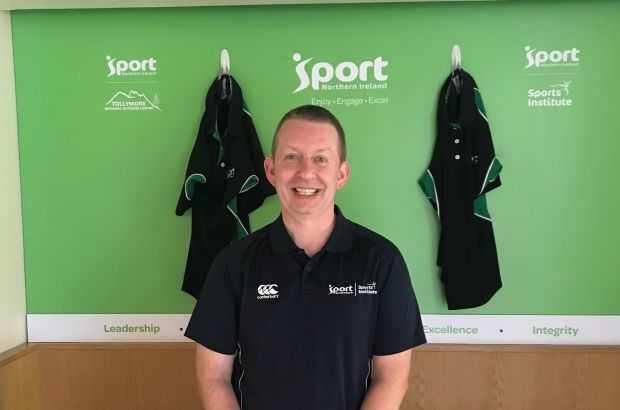By Des Jennings (Head of Performance Skills, Sport Northern Ireland)
It’s good to talk- and that’s why the role of a Performance Skills Coach is crucial in assisting athletes, coaches and practitioners maximise their sporting performances whilst also ensuring they manage their life stressors in the best way possible.
As someone who has dedicated my working life to psychology, initiatives and events such as Mental Health Awareness Week are something I warmly welcome. On a societal level, it is truly encouraging to see outdated understandings and notions of mental health be challenged and changed for the better. The walls of silence, ignorance and avoidance are slowly crumbling, replaced by an increasing openess to talking about mental health. This, combined with new research and better support, is definitely making a positive impact.
Mental Health and Elite Sport – the Challenges
It is widely recognised that sport and physical activity are powerful tools for promoting better mental health. Whether it is relieving stress, developing personal resilience, providing an opportunity to socialise with friends, building resilience or improving self-esteem, there are so many ways in which an active lifestyle can act as a cornerstone of emotional and mental wellbeing. But what happens when sport doesn’t provide an outlet or escape; when the demands and stresses of a life dedicated to training and competition are the source of someone’s mental health struggles?
Most of us have, at one stage or another in our lives, dreamt of enjoying the experience sports stars have when competing and winning at the highest levels. As someone who is lucky enough to support athletes at major sporting events, it is wonderful to even share such moments with them. But as a sports psychologist working with these talented individuals, teams and coaches I know that the full picture is much more complicated than you might think.
For many elite sportspeople, athletic success is at the absolute core of their identity. Failure to win, podium or qualify, the impact of injury, decisions around selection/deselection can undermine their sense of self (or may have implications in terms of, for example, funding). Whenever success is achieved, this can likewise create a sense of enormous pressure, as athletes deal with expectations of future success, be it the expectations they have of themselves or the perceived expectations of others. The challenge is to keep going, to keep improving, to keep winning.

Head of Performance Skills Des Jennings with fellow Sport NI colleagues who supported Team NI at the 2018 Commonwealth Games
This year, I had the tremendous opportunity to work with Team NI at the Gold Coast Commonwealth Games. It was an incredibly memorable and overwhelmingly positive experience. A key part of my role at the Games was to provide support to athletes who, while proud to have qualified and determined to succeed, may have found the experience daunting. The Commonwealth Games are a major international multisport competition, where daily schedules can change at short notice, where you’re surrounded by a team other of athletes and coaching staff, and with a big media microscope on you and friends and family in the stands or watching at home? It could understandably be very intimidating!
Dealing with these challenges is an integral part of being an athlete, and the ability to do this and remain resilient, focused and hungry for success is a reason why we admire elite sportspeople so much. Indeed a key tenet of my job is to help athletes and coaches develop the mental skills to help them strike this balance. As said in the first line of this article the role of a Performance Skills coach is crucial in athletic performance. Having a supportive (yet challenging) voice in an athlete’s corner allows them to turn emotion to logic, to make sense of the intense world of sport they absorb themselves in, to assist them in building a life beyond their sport (relationships, employment, media, sponsorship).
How Does a Performance Skills Coach Help?
Key to this is the strength of the relationship the performance skills coach has with the athlete/coach. Knowing what makes them tick; what makes them stress; the signs and behaviours that manifest in them is crucial in collectively addressing such issues to a successful conclusion. Simple yet effective strategies that assist in this process are goal setting, self-talk, relaxation, mindfulness, enhancing concentration. Key for each individual is the ability to identify their personal triggers (and responses) and thus the nature of this relationship between sportsperson and practitioners becomes directly related to the strength of the bespoke solution found for each sportsperson.
One of the big challenges facing elite athletes in maintaining good mental health is the huge proportion of their lives dedicated to training, competing and exceling with their sport. A lack of time to dedicate to non-sport activities can both prevent them from being able to ‘switch off’ from the pressures of their sporting life, and may be in itself a source of stress or unhappiness. What’s more, when an athlete comes to the end of their competitive career (naturally through age, or prematurely due to injury or other factors) they may be faced with an uncertain future. That’s why a key area of support provided by the Performance Skills Unit at the Sport NI Sports Institute is lifestyle management – helping athletes manage education, employment and other aspects of their lives alongside their sport. For instance, we would sometimes work to help athletes secure employment and mentoring opportunities – this gives athletes dedicated space and time to develop in a new and different setting and helps promote better mental and longer-term wellbeing beyond their athletic careers.
In my role within Sport Northern Ireland, I have also been involved in mental health projects working at other levels of the sporting pathway. In 2014 we launched a pilot Mental Health and Wellbeing programme. During the pilot programme, we partnered with many organisations, including the Public Health Agency, Sporting Chance and charities such as Mindwise and Aware NI (formerly Aware Defeat Depression) to provide mental health toolkits and training to sports clubs across NI. This programme built capability and capacity within over 40 sports clubs to assist them create a vision of good mental health for their members whilst also developing a programme that directly impacted on those members who needed direction in supporting their mental health areas. This included training of mental health officers who can play a hugely important role at grassroots level by acting as gatekeepers for those experiencing or concerned about mental health issues and building networks with statutory and voluntary providers that can help people offer support. Moreover, the experience of working on this initiative showed a growing culture of support and openness at all levels of sport.
As Mental Health Awareness Week 2018 draws to a close, I would encourage everyone working or involved in sport to continue to do what they can to tackle this most importance issue. A greater mindfulness of the ways in which people, even those competing at the highest levels, may be struggling and suffering, along with continued supportiveness, will help us maintain the momentum of this week and the last few years, as we go forward as a sporting community and society





